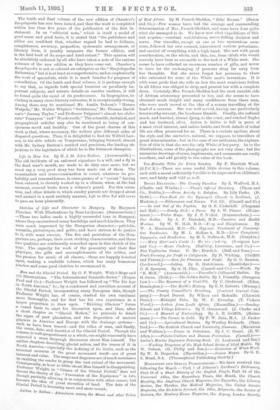The tenth and final volume of the new edition of
Chambers's Encyc/opcedia has now been issued, and thus the work is completed within less than five years of the publication of the first in- stalment. In an "editorial note," which is itself a model of good sense and good taste, it is stated that "the publishers and editor are confident that, whether regard be had to fullness, completeness, accuracy, proportion, systematic arrangement, or literary form, it greatly surpasses the former edition, and is the best book of its scope and kind extant." This opinion will lee absolutely endorsed by all who have taken a note of the various volumes of the new edition as they have come out. Climbers's Encyclopmelia is not so colossal an enterprise as the " Enoyclopeadia Britannica," but it is at least as comprehensive, and as emphatically the work of specialists, while it is much handier for purposes of consultation. Of the tenth and final volume, it is perhaps enough to say that, as regards both special treatises on peculiarly im- portant subjects, and minute details on smaller matters, it will be found quite the equal of its predecessors. In biographies, in- eluding in many cases literary estimates, it is exceptionally strong. Among these may be mentioned Mr. Austin Dobson's "Horace Walpole," Mr. Walter Whyte's " Swinburne," Mr. Thomas David- son's "Jeremy Taylor," and Professor Palgrave's almost too elabo- rate" Tennyson" and" Words worth." The scientific, technical, and geographical articles may also be mentioned as being of con- spicuous merit and lucidity. One of the great charms of this work is that, where necessary, the writers give different sides of disputed questions. Thus, it is delightful to find Sir Wilfrid Law- son, in his able article on Temperance, bringing forward, almost with Mr. Sydney Buxton's method and precision, the leading ob- jections to the legislation of which he is the foremost champion.


































 Previous page
Previous page